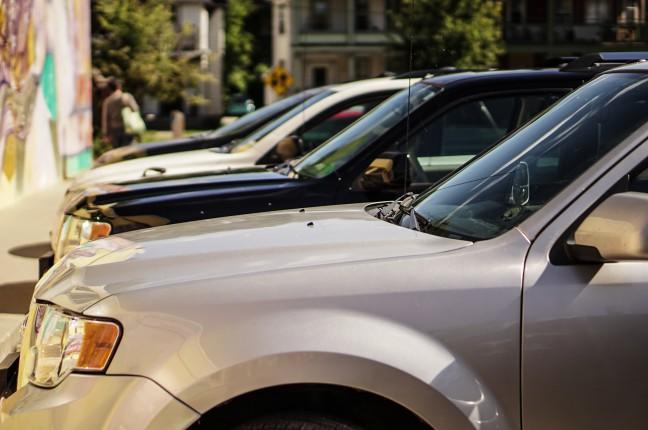The University of Wisconsin’s size, urban campus and lakeside position make parking cars difficult for students, Assistant Vice Chancellor of UW Transportation Services Patrick Kass said in an email statement to The Badger Herald.
UW has a total enrollment of approximately 50,000 students, 24,000 faculty and staff and only 13,000 available parking spaces, according to Kass.
Adding complexity to the issue, the City of Madison requires alternate side parking rules annually from November to March to facilitate snow removal. Under these rules, time of day dictates which side of the street is available for parking, according to the City of Madison website.
UW sophomore Katelyn Trowbridge said she subleases a parking spot through a neighboring apartment complex’s uncovered lot for $205 a month. Trowbridge said anytime UW is in session, it is very difficult for her to find parking or use her car on campus.
“There’s no way I could even drive to my class if I wanted to. The only thing I really get to use my car for is going to work off campus and going to get groceries off campus,” Trowbridge said. “I couldn’t imagine being a student who commutes.”
Criminal justice advocacy groups file lawsuit to keep measures off April ballot
UW professor of transportation Chris McCahill thinks that while parking in Madison is not easy, it is a common reality of living in a downtown urban area.
“It’s really hard to fund transit,” McCahill said. “There’s a lot of restrictions on how the city can use money and whether the state puts in money for transit … so it’s hard to build as much as we want.”
In order to combat this issue, the city invests in its public transportation, while the university puts money into public transportation of its own, McCahill said. UW’s approach is to offer students a range of services to get around the city and campus since there is limited space for cars.
The school works with Madison Metro Transit to provide students free busing around campus, which include routes 80, 81, 82 and 84. UW also offers shuttles, BCycle and Zipcar stations with discounted memberships, bike paths and SAFEwalk services, Kass said.
Additionally, Kass said UW is working with Madison Metro Transit to add a new supplemental shuttle to the Route 80 system in spring 2023 in response to reports of overcrowding of buses.
“Equitable campus access is an extremely important issue, as is sustainability,” Kass said in an email to The Badger Herald. “Transportation programs available to students focus on making it easier to access active and multimodal forms of transportation, such as riding the bus, biking, walking, and carsharing.”
The university is in charge of parking on the UW campus while the city controls the off-campus parking and garages, McCahill said. Building enough parking to accommodate all students would be an expensive task for the city and campus to take on.
Due to the high cost of construction and operation, a lot of parking garage expenses end up being subsidized by the city. This makes a solution for plentiful and affordable parking almost impossible, McCahill said.
The City of Madison paid over $100,000 per month in 2022 to pay for the cost of its parking spots, including the amount of money they make back in parking fees, according to an article from The Cap Times.
An analysis of the 20 E. Wilson St garage, one of the most expensive garages in the city, showed each spot cost around $450 to the city but only retailed for around $212, according to The Cap Times.
The narrow size and urban layout of Madison also contribute to the limited amount of space available for parking, Kass said. Not only is UW located on an isthmus, it also is an urban area that is home to the UW Health University Hospital, which requires parking accommodations of its own.
Madison mayoral candidates discuss campaign platforms ahead of primary
UW Transportation Services also offers systems to accommodate some student parking, Kass said. There are moped and e-scooter parking permits available, as well as temporary and annual disability permits for students. Graduate students can apply for parking permits at reduced costs. In certain cases, if criteria is met and space is available, permits can be offered to undergraduate students as well, Kass said.
UW already added one bus to the route 80 in 2020 due to rising demand, Kass said. But, the numbers of students taking the buses now are lower than the amount of riders seen before the 2020 changes.
The city of Madison will redesign the Metro Transit system during the summer of 2023, which aims to increase the number of direct routes available for riders, according to an article from The Badger Herald. But, some members of the UW community expressed disappointment in the plan, citing the removal of route 15 which would make it difficult for students living on the West Side of Madison to get to campus, the article said.

















